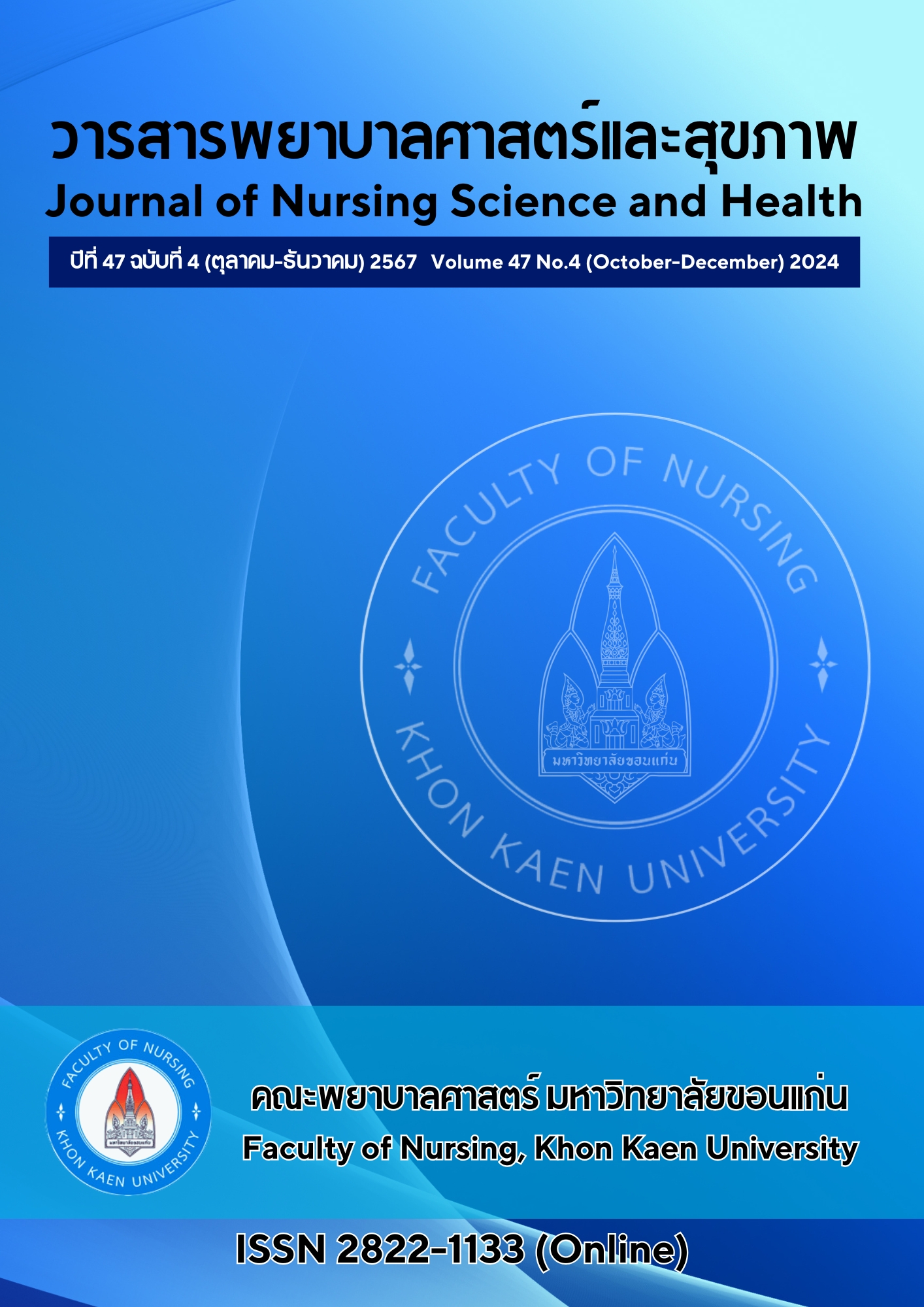ความทุกข์ทางจิตใจของผู้รอดชีวิตจากโรคหลอดเลือดสมองตามการรับรู้ ของผู้ป่วยและผู้ดูแล: การวิจัยเชิงปรากฏการณ์วิทยา
คำสำคัญ:
ความทุกข์ทางจิตใจ , ผู้รอดชีวิตจากโรคหลอดเลือดสมอง , โรคหลอดเลือดสมองบทคัดย่อ
การวิจัยเชิงคุณภาพแบบปรากฏการณ์วิทยานี้ มีวัตถุประสงค์เพื่ออธิบายมุมมองต่อความทุกข์ทางจิตใจของผู้รอดชีวิตจากโรคหลอดเลือดสมองตามการรับรู้ของผู้รอดชีวิตและผู้ดูแล เป็นการศึกษาในพื้นที่กึ่งเมืองกึ่งชนบทใน 2 ตำบลในจังหวัดขอนแก่น ผู้ให้ข้อมูลหลัก ได้แก่ ผู้ที่รอดชีวิตจากโรคหลอดเลือดสมอง 9 คน และผู้ดูแล 21 คน โดยการสัมภาษณ์เชิงลึก การสังเกตแบบไม่มีส่วนร่วม และการบันทึกภาคสนามเก็บรวบรวมข้อมูลระหว่างเดือนสิงหาคม-ธันวาคม 2564 วิเคราะห์ข้อมูลตามหลักการวิธีวิจัยปรากฏการณ์วิทยาเฮอร์เมนนิวติกซ์
ผลการวิจัย พบว่า มุมมองต่อความทุกข์ทางจิตใจของผู้รอดชีวิตจากโรคหลอดเลือดสมอง ประกอบด้วย 4 แก่นสาระหลัก ได้แก่ 1) ทุกข์เพราะมีข้อจำกัดของร่างกาย 2) ทุกข์เพราะขาดคนเยี่ยมเยียนช่วยเหลือ 3) ทุกข์เพราะขาดรายได้และมีหนี้สินจากการเจ็บป่วย และ 4) ทุกข์เพราะรู้สึกไร้ประโยชน์เป็นภาระต่อครอบครัว
ข้อค้นพบจากการวิจัยครั้งนี้ ชี้ให้เห็นถึงความสำคัญของการดูแลสุขภาพจิตในผู้ที่รอดชีวิตจากโรคหลอดเลือดสมอง ไม่เพียงแต่การดูแลด้านร่างกาย แต่ยังต้องคำนึงถึงการสนับสนุนทางสังคม การให้ความช่วยเหลือทางการเงิน และการเสริมสร้างความรู้สึกว่าผู้ที่รอดชีวิตจากโรคหลอดเลือดสมองยังมีคุณค่าในครอบครัวและสังคม การนำความเข้าใจเหล่านี้ ไปประยุกต์ใช้ในแนวทางการดูแลที่จะช่วยลดความทุกข์ทางจิตใจของผู้ป่วยได้อย่างมีประสิทธิภาพ
เอกสารอ้างอิง
Tsao CW, Aday AW, Almarzooq ZI, Alonso A, Beaton AZ, Bittencourt MS, et al. Heart disease and stroke statistics-2022 update: a report from the American Heart Association. Circulation 2022;145(8):e153–639.
Yao YY, Wei ZJ, Zhang YC, Li X, Gong L, Zhou JW, et al. Functional disability after ischemic stroke: a community-based cross-sectional study in Shanghai, China. Front Neurol 2021;12:649088.
The Stroke Foundation. Disability after a stroke [Internet]. TX: The Stroke Foundation; 2020[Updated 2020; Cited 2023 February 12]. Available from: https://thestrokefoundation.org/disability-after-a-stroke/
National Institute of Neurological Disorders and Stroke. Stroke information page [internet]. MD: NINDS; 2024[Updated 2020; Cited 2023 February 12]. Available from: https://www.ninds.nih.gov
Olibamoyo O, Adewuya A, Ola BA, Coker A, Atilola O. Prevalence and correlates of depression among nigerian stroke survivors. S Afr J Psychiatry 2019;25:1252.
Arwert HJ, De Kort PL, Meesters JJ, Klok CP, Fasotti L, Ribbers GM. Poststroke depression: a long-term problem for stroke survivors. Am J Phys Med Rehabil 2018;97(8):565-71.
Chuenjairuang P, Iamsamai S. The meaning and management of suffering from stroke disability in persons with stroke. Thai Pharm Health Sci J 2014;9(4):170-7. (in Thai)
Chen J, Zhang L, Zhang X, Zhao Y, Wu J. Post-stroke experiences and rehabilitation needs of community-dwelling Chinese stroke survivors: a qualitative study. Int J Environ Res Public Health 2023;20(15):1-15.
Wray F. Clarke dlonger-term needs of stroke survivors with communication difficulties living in the community: a systematic review and thematic synthesis of qualitative studies. BMJ Open 2017;7:e017944.
Langlois EV, Tunçalp Ö, Norris SL, Askew I, Ghaffar A. Qualitative evidence to improve guidelines and health decision-making. Bull World Health Organ 2018;96(2):79-79A.
Laverty SM. Hermeneutic phenomenology and phenomenology: a comparison of historical and methodological considerations. Int J Qual Methods 2003;2(3):21-35.
Kendall M, Cowey E, Mead G, Barber M, McAlpine C, Stott DJ, et al. Outcomes, experiences and palliative care in major stroke: a multicentre, mixed-method, longitudinal study. CMAJ 2018;190(9):E238-46.
Marshall B, Cardon P, Poddar A, Fontenot R. Does sample size matter in qualitative research? A review of qualitative interviews in IS research. J Comput Inf Syst 2013;54(1):11-22.
Lee J, Kim YS, Lee HS. Physical disability and depression in stroke survivors: a longitudinal study. J Stroke Cerebrovasc Dis 2021;30(5):105123.
Lim S, Chan KT, Lee DT. Social support and psychological well-being in stroke survivors: a systematic review. Disabil Rehabil 2022;44(2):256-65.
Drageset J, Dysvik E, Espehaug B, Natvig GK, Furnes B. Suffering and mental health among older people living in nursing homes: a mixed-methods study. Peer J 2015;3:e1120.
Wenzel RA, Zgoda EA, St Clair MC, Knecht-Sabres LJ. A qualitative study investigating stroke survivors’ perceptions of their psychosocial needs being met during rehabilitation. Open J Occup Ther 2021;9(2):1-16.
Fang T, Wang D, He Z, Wang X, Wang Y, Gao Y, et al. Financial stress and mental health outcomes among stroke patients: a population-based study. Stroke 2020;51(7):1931-8.
Xu L, Dong Q, Jin A, Zeng S, Wang K, Yang X, et al. Experience of financial toxicity and coping strategies in young and middle-aged patients with stroke: a qualitative study. BMC Health Serv Res 2024;24(1):94.
Chen H, Zhang N, Zhao W, Fan X, Sun S. Perceived burden and psychological distress among stroke survivors and their caregivers: a cross-sectional study. BMC Geriatr 2019;19(1):250.
Hale AJ, Ricotta DN, Freed J, Smith CC, Huang GC. Adapting Maslow’s Hierarchy of Needs as a framework for resident wellness. Teach Learn Med. 2018;31(1):109-18. doi:10.1080/10401334.2018.1456928.
Afrin A. Body image and self-esteem dynamics in the context of performing self-care activities among people with stroke: a qualitative study [dissertation]. Bangladesh: Bangladesh Health Professions Institute, Faculty of Medicine, University of Dhaka; 2023.
Pindus DM, Mullis R, Lim L, Wellwood I, Rundell AV, Abd Aziz NA, et al. Stroke survivors' and informal caregivers' experiences of primary care and community healthcare services: a systematic review and meta-ethnography. PLoS One. 2018;13(2)
Harrison M, Ryan T, Gardiner C, Jones A. Psychological and emotional needs, assessment, and support post-stroke: a multi-perspective qualitative study. Top Stroke Rehabil 2017;24(2):119-25.
Lin S, Wang C, Wang Q, Xie S, Tu Q, Zhang H, et al. The experience of stroke survivors and caregivers during hospital-to-home transitional care: a qualitative longitudinal study. Int J Nurs Stud 2022;130:104213.
Wei Y, Ren X, Su X, Wang X, Hua Y, Chen Y, et al. Predictors and changes of self-perceived burden among stroke survivors: a 3-month follow-up study. Front Neurol. 2020;11:742.
ดาวน์โหลด
เผยแพร่แล้ว
รูปแบบการอ้างอิง
ฉบับ
ประเภทบทความ
สัญญาอนุญาต
ลิขสิทธิ์ (c) 2024 วารสารพยาบาลศาสตร์และสุขภาพ

อนุญาตภายใต้เงื่อนไข Creative Commons Attribution-NonCommercial-NoDerivatives 4.0 International License.
วารสารพยาบาลศาสตร์และสุขภาพเป็นเจ้าของลิขสิทธิ์ในการเผยแพร่ผลงานที่ตีพิมพ์ห้ามผู้ใดนำบทความที่ได้รับการตีพิมพ์ในวารสารพยาบาลศาสตร์และสุขภาพไปเผยแพร่ในลักษณะต่าง ๆ ดังนี้ การนำบทความไปเผยแพร่ออนไลน์ การถ่ายเอกสารบทความเพื่อกิจกรรมที่ไม่ใช่การเรียนการสอน การส่งบทความไปตีพิมพ์เผยแพร่ที่อื่น ยกเว้นเสียแต่ได้รับอนุญาตจากวารสารพยาบาลศาสตร์และสุขภาพ



